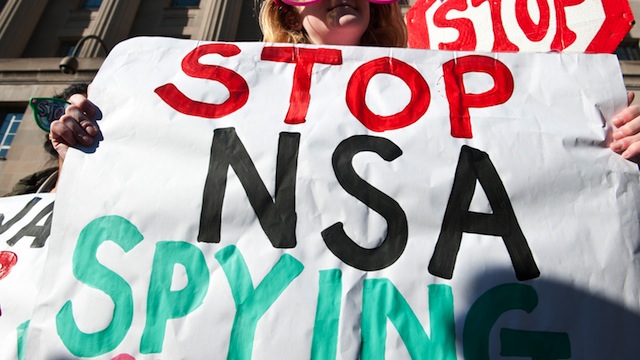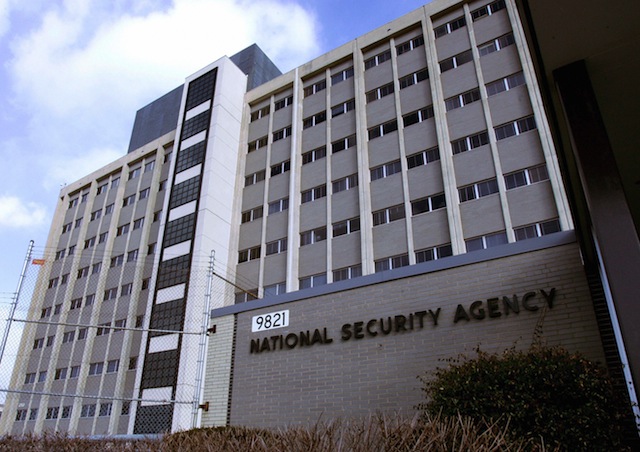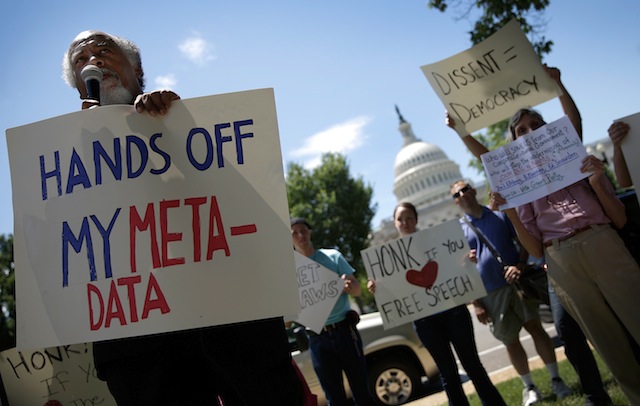
(Getty)
Today Congress took its first major steps toward curbing the NSA’s power to bulk-collect personal information on millions of Americans. On May 22, the House of Representatives voted on H.R.3361, also known as the USA Freedom Act, a bill that will attempt to limit NSA’s collection of Americans’ meta-data collection and internet information.
However, as the bill became subject to more and more cuts by surveillance sympathizers, privacy advocates have now mostly turned their backs on the bill.
Here is what you need to know:
1. The House Voted for the Bill on May 22

(Getty)
On Monday May 19, House Majority Leader Eric Cantor (R-Va) announced that the USA Freedom Act was tentatively scheduled for debate and vote later in theweek. Now, advocacy groups have reported that the vote took place on the floor of the House on Thursday May 22.
Demand Progress and the participatory Whip count polled before the vote that just over half the House of Representatives who “lean yea.” On May 22, the bill was approved with a vote of 303 to 121.
179 Republicans and 124 Democrats voted yea, whereas 51 Republicans and 70 Democrats voted nay. You can read the whole roll call here.
The ACLU released the following statement on the bill’s passage:
While far from perfect, this bill is an unambiguous statement of congressional intent to rein in the out-of-control NSA. While we share the concerns of many – including members of both parties who rightly believe the bill does not go far enough – without it we would be left with no reform at all, or worse, a House Intelligence Committee bill that would have cemented bulk collection of Americans’ communications into law. We will fight to secure additional improvements in the Senate.
2. The House & Senate Bill Are Different
There are now two different versions of the USA Freedom Act, the one introduced into the senate by Senator Patrick Leahy (D-VT), and the one in the House introduced by Jim Sensenbrenner. After months, the House version, drastically changed, finally made its way out of the House Judiciary Committee and was ready to be presented to the representatives. According to the Electronic Frontier Foundation, a group that advocacy for an open internet free of surveillance, Leahy’s version of the bill remains in its original form, but “languishes” in the Senate.
The Senate version still aims to limit bulk data collection for Americans, limit the NSA’s ability to copy and store information (FISAA Section 702), increase transparency for the Foreign Intelligence Surveillance Court (FISC), and create a FISC civil liberties advocate.
You can read an original draft of the House bill above.
3. Privacy Advocates Are Concerned Because the Bill Was ‘Gutted’

(Getty)
After major changes done to the bill in the House Judiciary Committee and the House Intelligence Committee, privacy advocates are not weighing the decision to pull their support of the “watered-down bill,” reports The Hill.
The EFF reports that the new version of the House will focuses mainly on restricting the NSA’s collection of telephone meta data and leaves out any mention of internet history or information acquired by the NSA’s PRISM program. The revised bill contains a few of its old reforms, such as limiting how general an entity could be with the court when they request information on a specific person or organization, but for the most part, the bill needs stronger language as it still allows for the , “overcollection, overretention, and oversharing of Americans’ communications ‘mistakenly’ collected.”
4. The Bill Was Introduced by Jim Sensenbrenner
Republican Jim Sensenbrenner introduced the bill into the house on October 29, 2013. Above you can hear him discuss his detest of NSA bulk data collection before the House.
5. A Similar Bill Almost Passed Last Year
In June 2013, just weeks after the first of Edward Snowden’s NSA Revelations, Representative Justin Amash (R-MI) introduced a bill to defund the bulk collection millions of Americans’ data. The bill, propelled forward by the terrifying nature of the revelations, almost passed the House, loosing 205 to 217 votes.
Amash said of the USA Freedom Act:
This morning’s bill maintains and codifies a large-scale, unconstitutional domestic spying program. It claims to end ‘bulk collection’ of Americans’ data only in a very technical sense: The bill prohibits the government from, for example, ordering a telephone company to turn over all its call records every day.
Above you can hear Amash talking about his bill and the NSA.